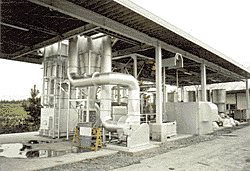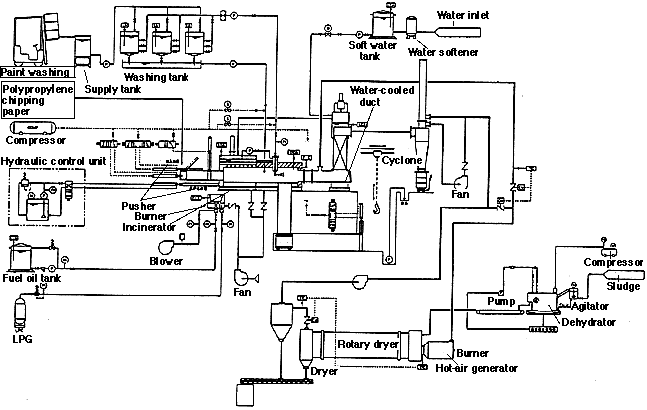Waste Treatment Technology in JAPAN
Drying, Incineration and Melting
2) Industrial waste : Polyester, polypropylene, natural rubber
3) Liquid waste : Waste oil, paint cleaner, chemical waste liquids, etc.
2) Exhaust gas from the incinerator rises to temperatures in excess of 800deg.C.
As a result, organic matter is broken down by oxidization, eliminating any
influence on the waste to be dried.
3) A rotary drier with stirrer vanes is used as the drier to ensure savings in
space.
4) Auxiliary equipment such waste-water treatment facilities and waste-heat
recovery equipment is being used effectively at many other installations.
2) Liquid waste: 3700kg/clay
3) Effective recycling:
Sludge reduction
4.8 ton/day (65% W.B.) -> 1.9 ton/day (10% W.B.)
Figure l Slurry Reducing System
Introduction
This leaflet introduces equipment for drying and reducing inorganic sludge (slurry). Slurry is dried and reduced using the hot exhaust gas generated when incinerating solid waste (paper, plastic and wood scraps) generated in factories together with liquid waste such as paint cleaner that is difficult to incinerate.
The following waste can be incinerated:
1) General waste : Paper, wood, leather, etc.
Effective Recycling
1) Drying and reduction of inorganic sludge (slurry)
2) Drying and reduction of waste-water treated sludge
Features
1) We can supply the most suitable model from our extensive range of incinerators
to suit the characteristics of the waste (e.g. combined combustion of solids
and liquids) and user preferences (e.g. labor-saving).
Installation Example
1) Solid waste: 2100 kg/day


PLANT DIVISION
ENVIRONMENTAL ENGINEERING Department n
ShinOsaka Wako Bldg 7F
4-6-18 MIYAHARA YODOGAWA-KU
OSAKA 532 JAPAN
TEL: +81-6-350-3770 FAX: +81-6-350-3775